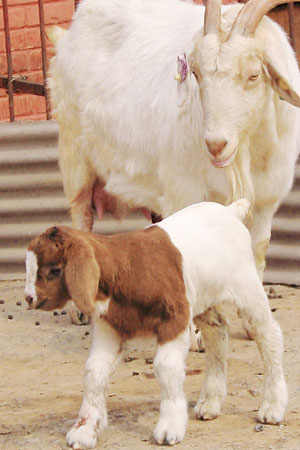Boer goat cloned from somatic cells born in China
(Xinhua)Updated: 2007-04-09 22:11
TIANJIN - The world's second and China's first Boer goat cloned from somatic cells was born in the northern Chinese city of Tianjin on Monday, indicating that the nation has reached world's advanced level in somatic cell cloning technology.
 The world's second and China's first Boer goat cloned from somatic cells was born in the northern Chinese city of Tianjin on Monday. [Xinhua]  |
The female lamb, weighing 5.5 kg, was born at about 12:40 p.m. at the Tianjin Veterinary Research Institute, a research body that has been engaged in the somatic cell cloning program since 2000, with the help of Ling Liu, a Chinese-American scientist who specializes in cloning technology.
In 2003, science workers with the institute extracted skin cells from the ears of a Boer goat introduced from Australia and put the cells into a mature germ cell which was obtained from an ordinary goat and whose cell nucleus had been removed, thus making a clone embryo to be transplanted into the body of a local ordinary female goat, said Dr. Liu Haijun, who leads Tianjin's somatic cell cloning program.
"After hundreds of experiments, the clone embryo was finally implanted into a local ordinary female goat, which gave birth to a lamb after 155 days of pregnancy, and we got the same replica as the genes of the original species of Boer goat," he said.
The Boer goat, a species from southern Africa, grows extremely fast and yields more meat than ordinary goat or sheep. An adult Boer goat weighs about 100 kg and can provide more than 40 kg of meat.
Ding Boliang, head of the Tianjin institute, said that science workers can build a bank of somatic cells for original livestock species following the breakthrough of the somatic cell cloning technology, thus greatly shortening the process of livestock breeding.
"We can also save endangered rare species or critically-ill animals by extracting skin cells from their bodies and using somatic cell cloning technology to achieve a rapid and abundant breeding," he said.
The world's first Boer goat cloned from somatic cells was born in 2001 in Ling Liu's Reproductive Science Lab, College of Veterinary Medicine, Texas A&M University.
|
||
|
||
|
|